LONG READ: How Lando Norris is breaking the F1 driver mould
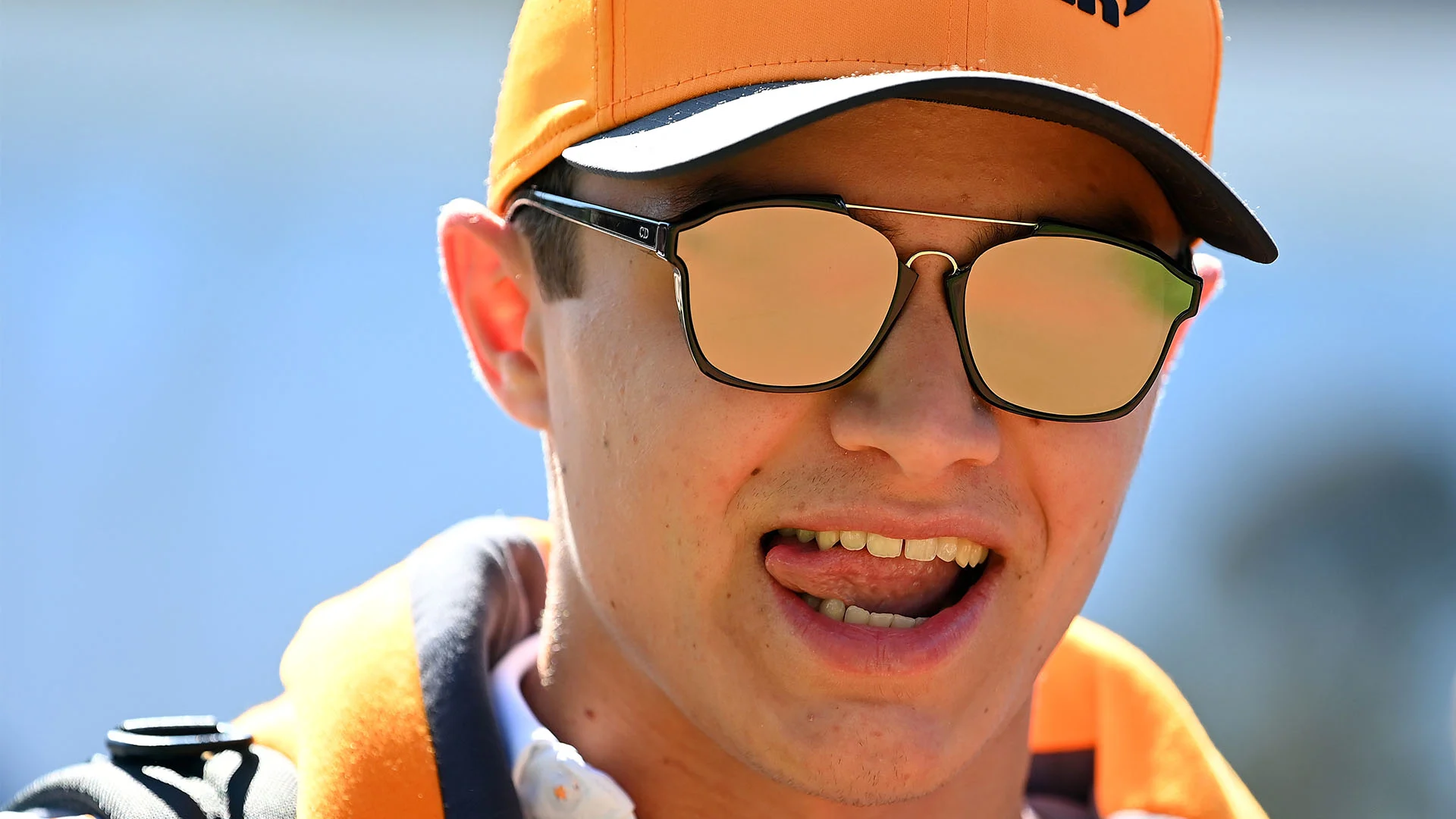
How does playing video games or drifting supermarket trolleys make you a better racing driver? In a feature from the Official Formula 1 Magazine, James Roberts gets the answers from McLaren’s Lando Norris…
You have probably never heard of Mihaly Csikszentmihalyi, but he is the Hungarian-American psychologist who identified the highly focused mental state that athletes, including racing drivers, enter when they are at peak performance. When running a 100-metre sprint, competing in a Grand Prix, or even playing a musical instrument, the brain puts aside mundane thoughts – and even notions of time – to enable it to function at a level best described as being ‘in the zone’. Csikszentmihalyi labelled this moment of complete absorption into a skilled activity as ‘flow’.
Crucially, this is a state of mind that makes people happy, and in the modern world a common activity that brings about this sensation is playing video games. The simple act of beating a high score results in a sense of satisfaction that encourages a player to continually try to better it. This ‘re-play’ appeal has an addictive quality that fuels a quest to constantly improve one’s performance while in a state of ‘flow’, just as top athletes can’t resist the challenge to go higher, faster and further than they have done before.
“It’s the same with a lap time,” says keen gamer and McLaren Formula 1 driver Lando Norris. “When I play games that require a lot of brain power, they keep me focused and they give me a similar feeling to when I’m driving a car. How can I do this better? How can I improve this corner? Where can I overtake the car in front?
"Driving and video games like [shoot ’em up] Call of Duty are very different worlds, but they correlate in so many thought processes. The way you think about things, the strategies you need to think differently so you can out-play an opponent: What do I have to do to beat this guy? Achieving perfection, muscle memory, managing an array of information to make split-second decisions. The two things are actually very similar.”
Watch the final two laps of the season-opening Austrian Grand Prix on-board with Norris in the video above and you’ll understand exactly what he means. Confronted with a vast amount of information and a very clear target, he has to balance all of his skills and decision-making while avoiding any errors in order to achieve what would be the best result of his career at that point. For the viewer, it seems just like a game.
On the penultimate lap his engineer Will Joseph explains to Norris on team radio that Lewis Hamilton, running in third, is 6.5 seconds up the road, but has a five-second penalty. Not only has Norris driven an F1 car on the limit for 90 minutes, but he has now to execute additional functions in his quest for his first-ever podium. The goal is in reach.
DATA ANALYSIS: How Norris beat Hamilton to the podium with one amazing lap
“Yellow G-2,” says Joseph, which leads the youngster to change a function on his steering wheel while approaching 160mph. Heading towards Turn 9, Norris is given further details that he must retain and act on during the following lap. “Stay in Scenario 7 until Turn 3” followed quickly by “Track obstruction Turn 1.” As he observes the yellow flag, assesses the danger, avoids the debris and heads towards Turn 2 on his final lap, his engineer fires out more instructions: “Single press overtake here and out of Turn 3,” then “Out of Turn 8 press and hold overtake for five seconds.”
As the race comes to an end, Norris discovers he is within 4.8 seconds of Hamilton and – brilliantly – has achieved what was asked of him to claim his first podium in Formula 1. The elation and euphoria that follows is his reward for maintaining concentration in this state of ‘flow’. The result is third overall, including a bonus point for fastest lap, in the most important high-score table of them all: the FIA Formula 1 Drivers’ World Championship.
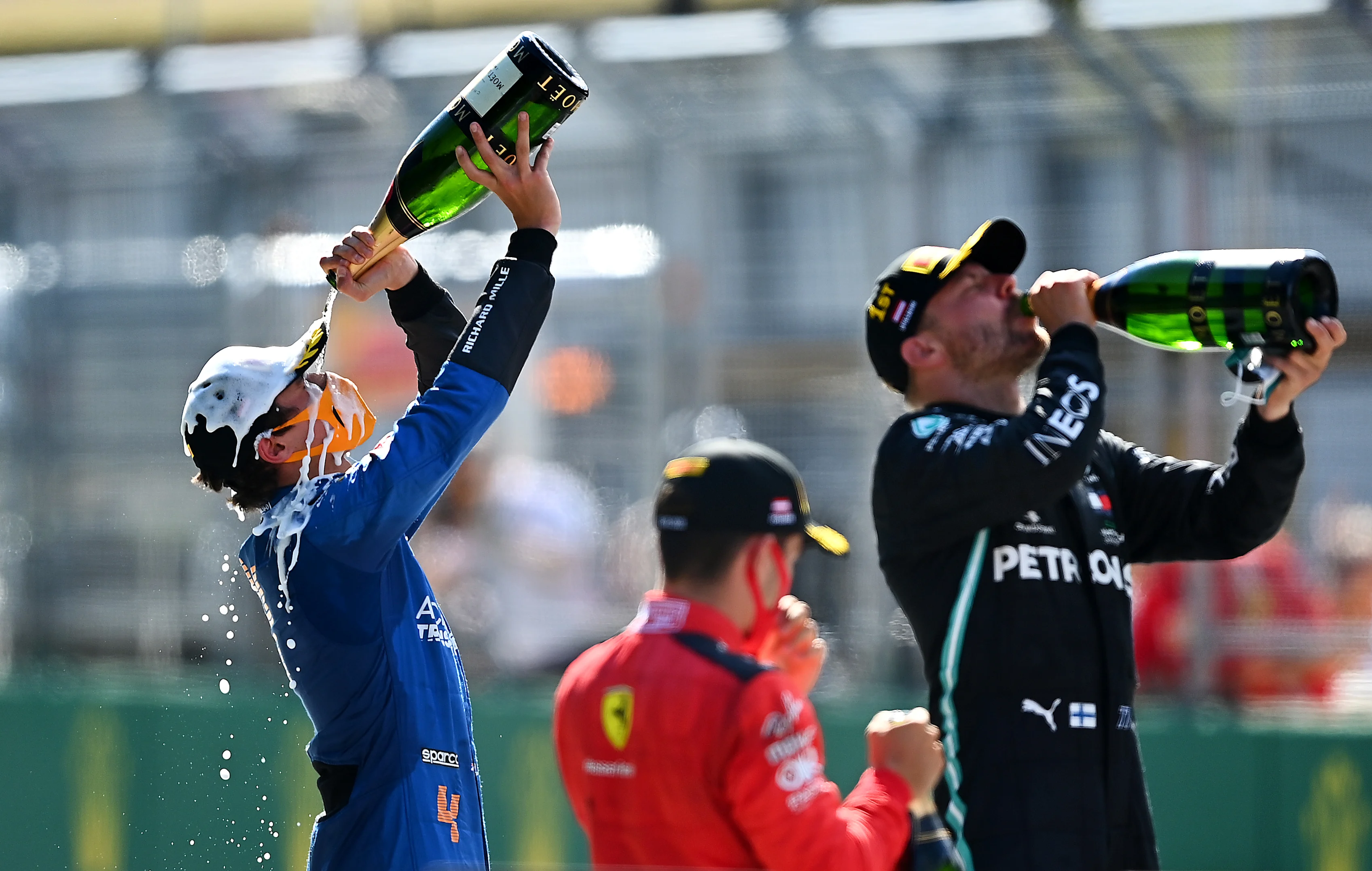
In only his second full season in Formula 1, it hasn’t taken long for Norris to achieve his first podium. At just 20 years of age, there is a youthful exuberance to his temperament and his driving that makes him exciting to watch. You can sense an optimism and a relentless energy behind the wheel that contrasts sharply with the occasionally more tired displays of some of the more experienced campaigners on the grid. That he has been able to showcase his skills at the forefront of F1 has been the result of a dramatic change in the culture and performance of McLaren.
A reserve driver for the Woking-based outfit in 2018 – the year he also clinched the runner-up spot in Formula 2 – he recalls that things were very different within the team back when Fernando Alonso and Stoffel Vandoorne were behind the wheel. “It has changed a huge amount,” he says. “I don’t think it was the lowest point when I joined, but they’d had a few tough years. At the beginning of last year there was already a change starting. They simplified everything. From a car perspective, they took all the fancy bits off, reset and took steps back to start again with building an F1 car. We then made progress to finish two places higher up in fourth
With more points, there’s more prize money and we begin to look like a professional F1 team, rather than a team that is just participating in the sport
It’s been well-publicised, but the arrival of new team principal Andreas Seidl, plus the hiring of technical director James Key, gave McLaren the clean slate it needed. There was a reorganising of staff, a prioritising of strategic infrastructure – such as a new windtunnel – and the culture inside both the garage and back at the McLaren Technology Centre (MTC) started to shift. A ‘bromance’ between Norris and the equally engaging Carlos Sainz gave McLaren a feel-good vibe.
“Absolutely. It’s a fun place now, it’s enjoyable, but we do need to get the balance right with having fun and being professional,” says Norris. “We have a job to do, which is to perform on track, not make mistakes, have good pit stops. But the atmosphere has boosted everyone and I think that has made everyone work that little bit harder and more precisely. With more points, there’s more prize money and we begin to look like a professional Formula 1 team, rather than a team that is just participating in the sport. It’s been an awesome journey, even though it has only been two years, but it’s great to see the difference from what it was, to what it is now.”
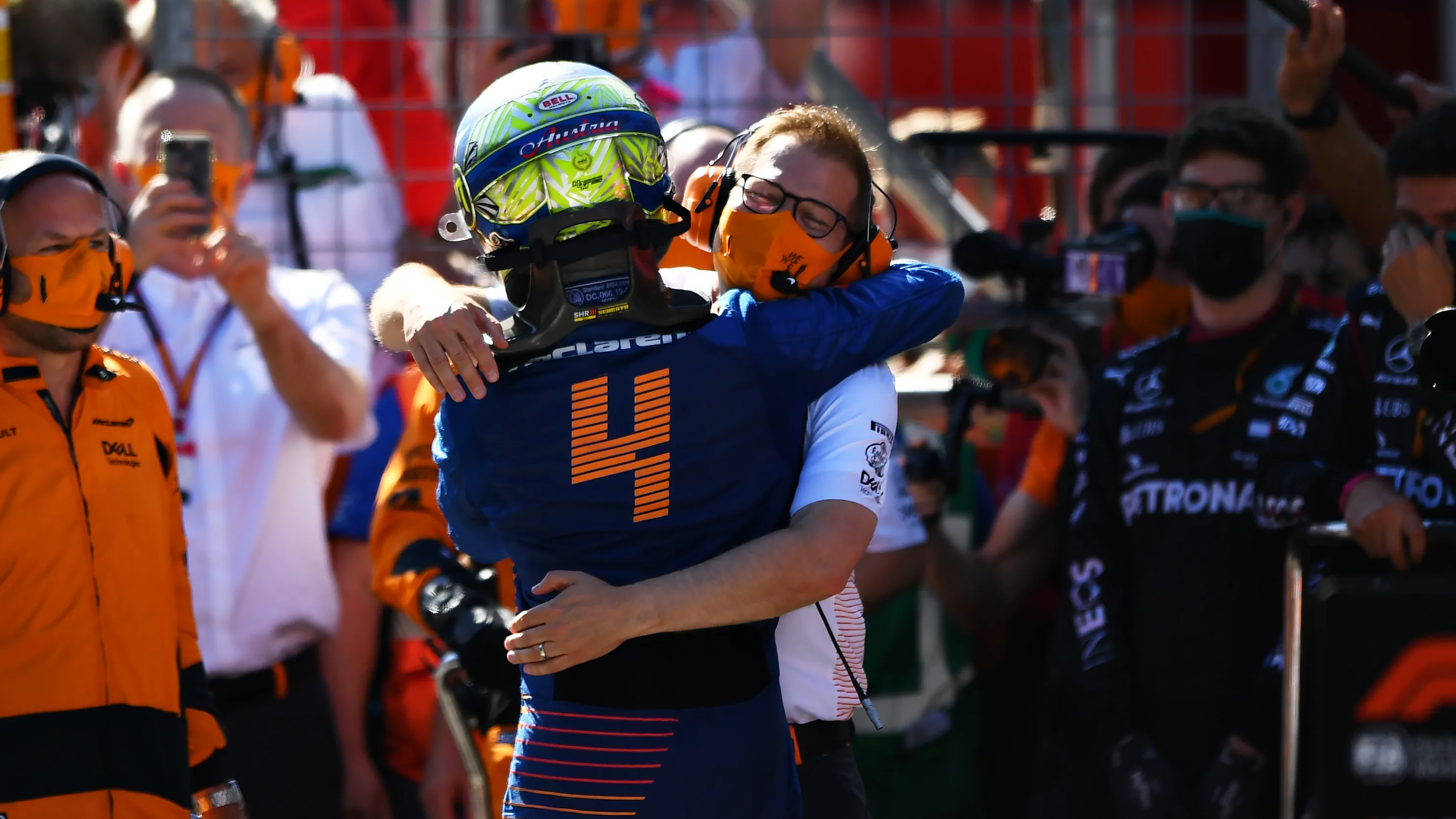
There are further bright spots on the horizon, too, with the team switching to Mercedes power units next year, despite the relative freezing with chassis, and the arrival of Daniel Ricciardo, who comes in to replace Ferrari-bound Sainz. If the relationship between the McLaren team mates is strong and light-hearted now, expect comedy gold next year. Norris can’t hide a smirk at the prospect of having Ricciardo as a team mate. “With him being the fun guy of the paddock, it will be another good boost for the team,” he says, adding: “It’s also someone different to shake things up a little bit. He’s won races, driven for championship-winning teams and so he’s going to bring something more. Next year we’ll just take that next step, work hard and play hard along the way to hopefully score more podiums and win races.”
READ MORE: New McLaren wind tunnel 'critical' to future performance, says Tech Director Key
Norris is at ease as he speaks; sitting alone with his feet up at a single table, wearing a headset and looking into a laptop as we chat over Zoom, as per the present Covid-19 protocols. Sainz sits at an adjacent table with the same set-up.
It seems the Englishman has changed little from the days when he was romping through the junior formulas with ease, which in fairness, wasn’t that long ago. The pressure and expectations of F1 don’t seem to have altered his demeanour and his greater fame certainly hasn’t made him arrogant or aloof. If anything he is even more gregarious.
“When I came into Formula 1,” he recalls, “I soon realised what it was like to work with some extraordinarily talented people, mechanics and engineers. Early on I saw they were building the car and it looked like a draining job for them.
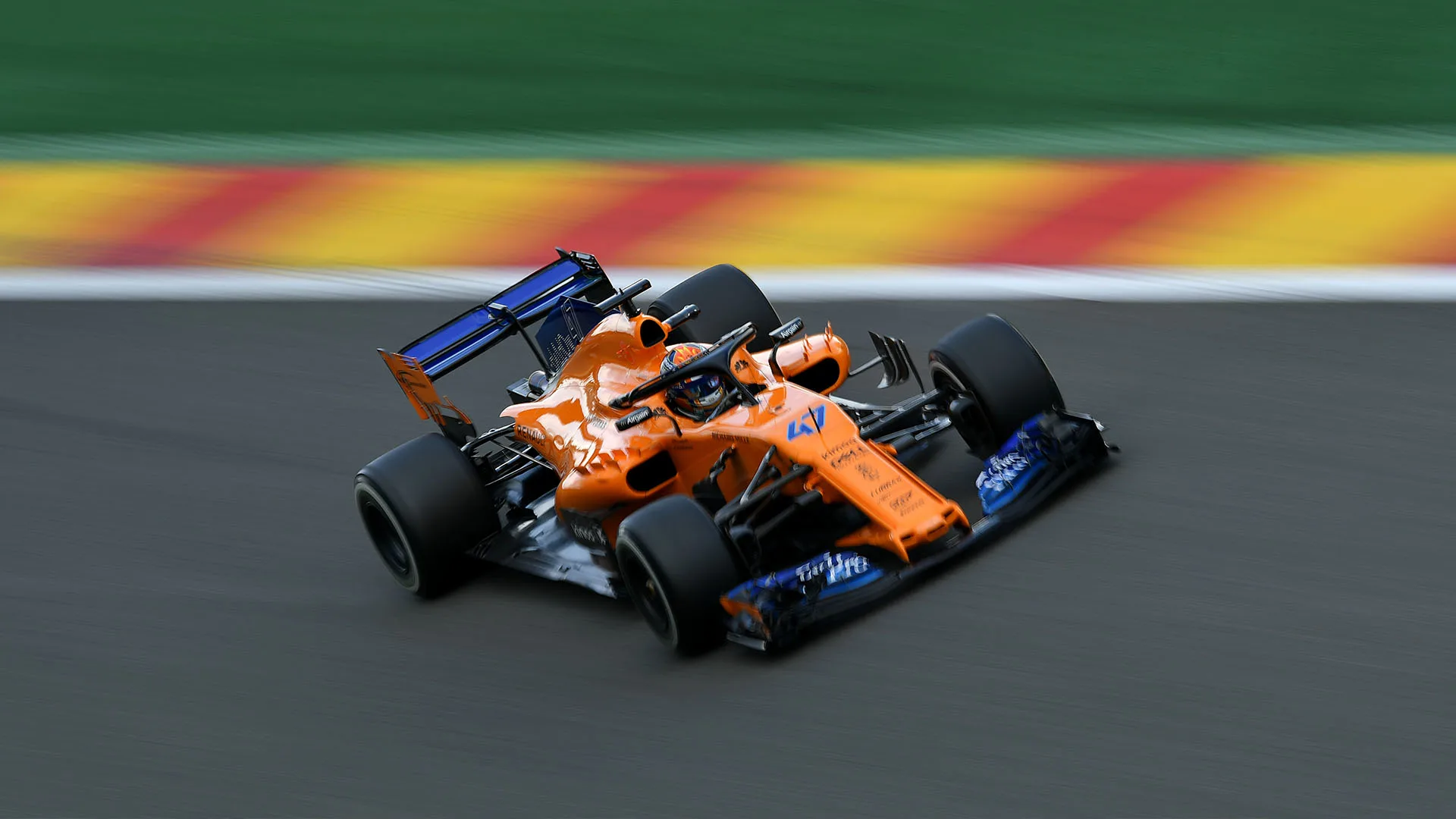
“One of the things I wanted to do – and it was something I learnt coming up through my career – was to be involved with the team as much as I could.
“When I’m at the MTC [McLaren Technology Centre], I go down to whatever floor is busy and I say hello to everyone and integrate myself into the team by trying to get to know as many people as possible. I don’t want to be the Formula 1 driver that everyone looks up to but who isn’t willing to be part of the team. I want to give a little bit back. I hope it motivates people when they are able to ask me questions, like ‘what’s it like to drive a Formula 1 car around Spa?’
“These guys works tirelessly for hours – late nights, weekends and away from their family a lot – but they do it because it’s Formula 1 and they love it. It’s their passion. They didn’t get the opportunity to speak to drivers and ask questions like that in years past, but I want people to see that I’m a normal person. I’m not a guy who’s got to Formula 1 and has no interest in anything else that goes on in the world.”
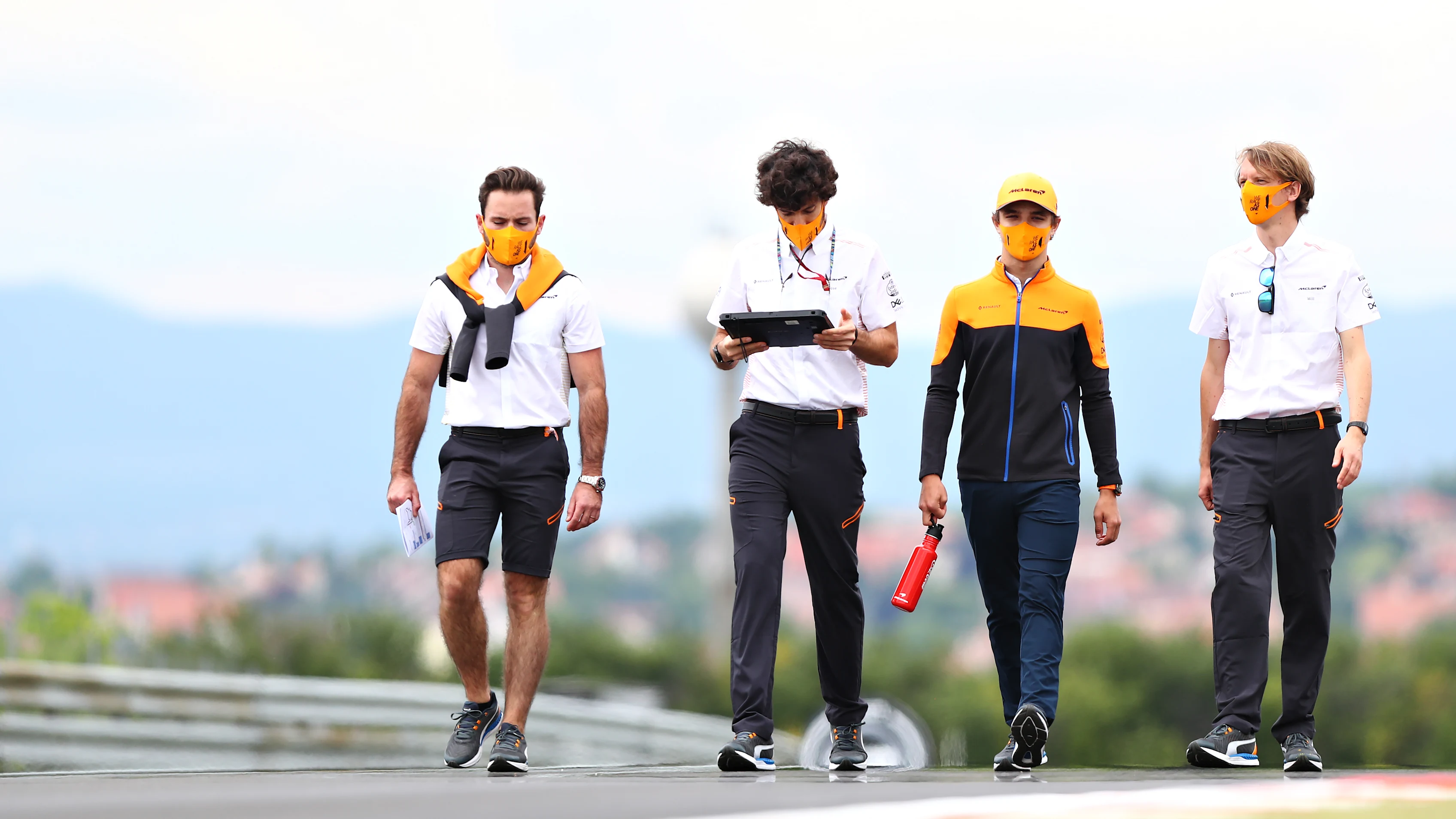
If anything typifies the fact Norris is unlike many of his F1 contemporaries, it’s the photograph that went viral in the aftermath of the Hungarian Grand Prix. The McLaren driver donned a hi-vis T-shirt and helped his mechanics strip down his car after the race. While many drivers would have jetted out on their private planes without so much as a cheery wave, Norris got stuck in.
He posted the picture on social media and wrote: “If you want to go fast, go alone. If you want to go far, go together. Three long weeks for my team. Thought they could use a couple more hands.”
READ MORE: Lando Norris spotted helping McLaren strip his car after Hungarian GP
With an impressive social media following, including nearly two million fans on Instagram, and a seemingly constant presence on Twitch, where he live-streams his gaming exploits, Norris is quickly becoming the fresh face of F1, engaging a completely new generation by providing a window into his life away from racing.
Over the past few decades, Formula 1 drivers have often seemed removed from everyday life, reducing the publicity and media interviews they offer, but Norris has gone in the opposite direction, allowing fans to watch and join him in entire evenings playing online. The resultant popularity encouraged fellow racers Charles Leclerc, George Russell and Alex Albon to follow in his footsteps as they competed together. “They only started doing it because I was,” says Norris with a smile.
Even the decision to award the design of his special British Grand Prix helmet to a six-year-old says much about his appeal to a younger generation of fan.
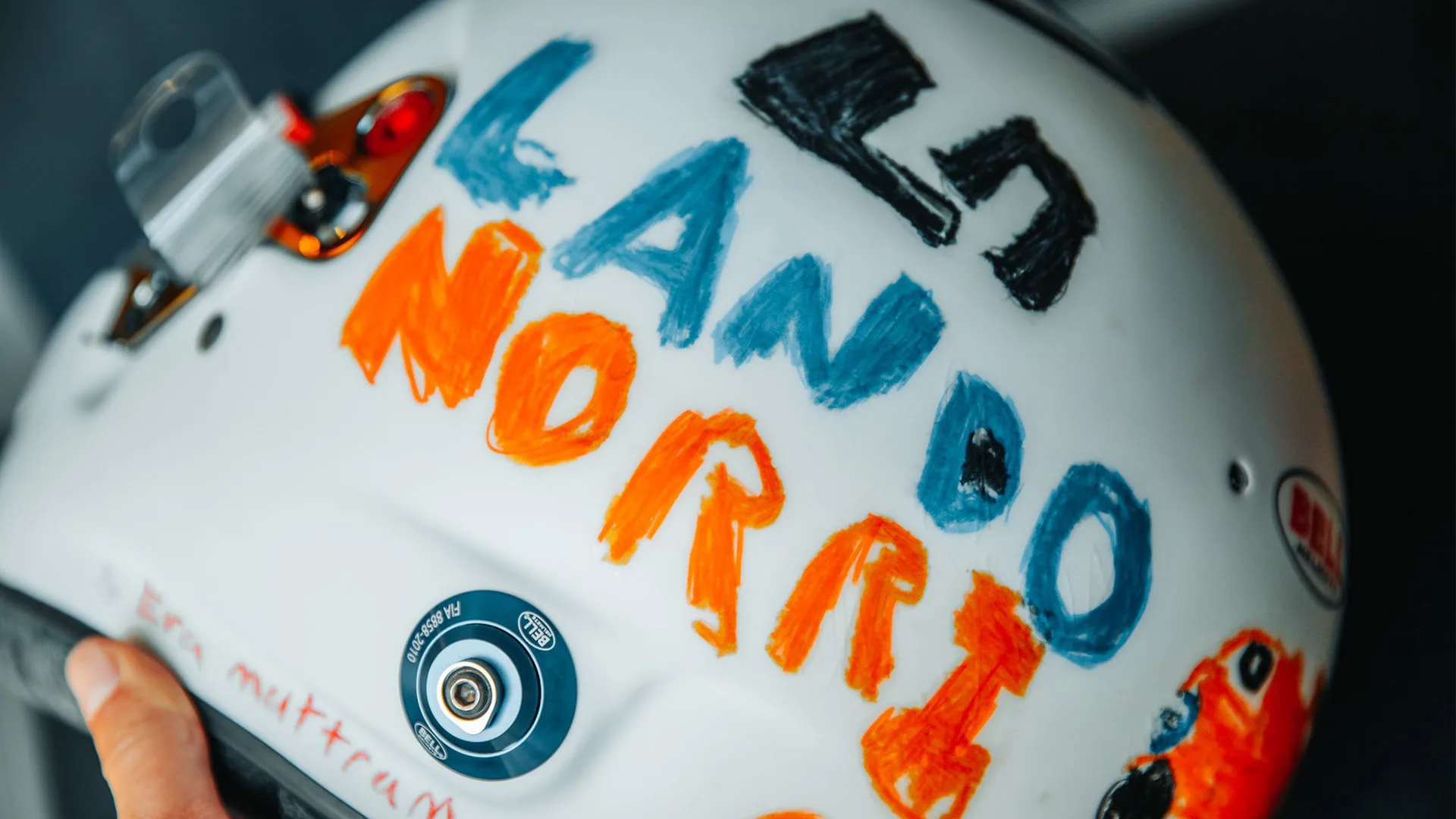
“I started streaming on Twitch a few years ago, but there was no grand plan,” he says. “I have a wider audience because of being active on social media and having fun playing games. Lots of drivers do. Max [Verstappen] takes his PlayStation everywhere and loves playing games, but he does so with his mates rather than streaming it to everyone. But that’s the way the world is going. There are a lot of kids growing up who want to watch professional gamers or see what their heroes are like as people. That’s because they don’t have any other opportunity to meet them or to get to know them or anything like that.
“I think that who I am and what I do – playing games and having fun, enjoying life – it has the bonus of attracting younger fans. Boys and girls who want to grow up to be race car drivers can see that I am a normal person. I sometimes get annoyed and mad and shout at the game and at people because it’s the normal thing people do when playing games. I’m not some super-human person.”
LISTEN: Lando Norris on meeting Helmut Marko, friendships with rivals – and much more
To emphasise the point that he doesn’t live with his head in the clouds, Norris owns up to being perfectly content driving his Renault Megane company car to the airport, instead of his McLaren GT, because of the better luggage space. As part of a wider discussion about his everyday habits, he reveals how he likes to gamify real-life situations – from travelling to shopping trips – setting himself small goals and targets in order to enjoy the positive feelings of accomplishment.
We’ve all played the game in the airport where you try to improve a personal time from the air bridge to exiting the luggage hall by looking for gaps in crowds, clipping the apex of the terminal corridors or walking up and down the escalators, dodging passengers who give the impression it’s their first ever time in an airport. “Especially when they get on your nerves!” he laughs. “You have to out-smart them and out-play them. If you attempt to pass someone slow and they speed up, you’re like ‘what is this guy doing?!’ So you then cut the corner or go through a short cut and come out ahead of them. Job done.”
Norris clearly likes to make life fun, even if it’s just a trip to the shops. “I think there are many instances in everyday life when you play games,” he adds. “How often do you go to Tesco and try and do a Scandinavian flick [the art of shifting the weight one way to increase the momentum of the slide in the other direction, pioneered on the snowy rally stages by Scandinavian drivers] with the trolley, and when it’s heavy, so it’s that bit harder to turn, but you try and do it to clip the apex of the aisle.
“I think it’s subconscious, trying new things to improve time and performance. It’s exactly the same in racing…”
Despite the distractions that come with a career in motor racing, Norris’s natural talent, personality and propensity to keep bettering himself – whether online, on the racing circuit or in the supermarket – are already making him one of the most popular drivers in the sport. The prospects of a long and successful career in F1 seem good as long as he keeps following his natural flow.
The Official Formula 1 Magazine is your perfect monthly companion to the world of Formula 1. Buy Issue 7 now or sign up for a worldwide monthly subscription with a 40% discount by using Editor40 at checkout at www.thef1magazine.com where you can also buy our Italian language edition.
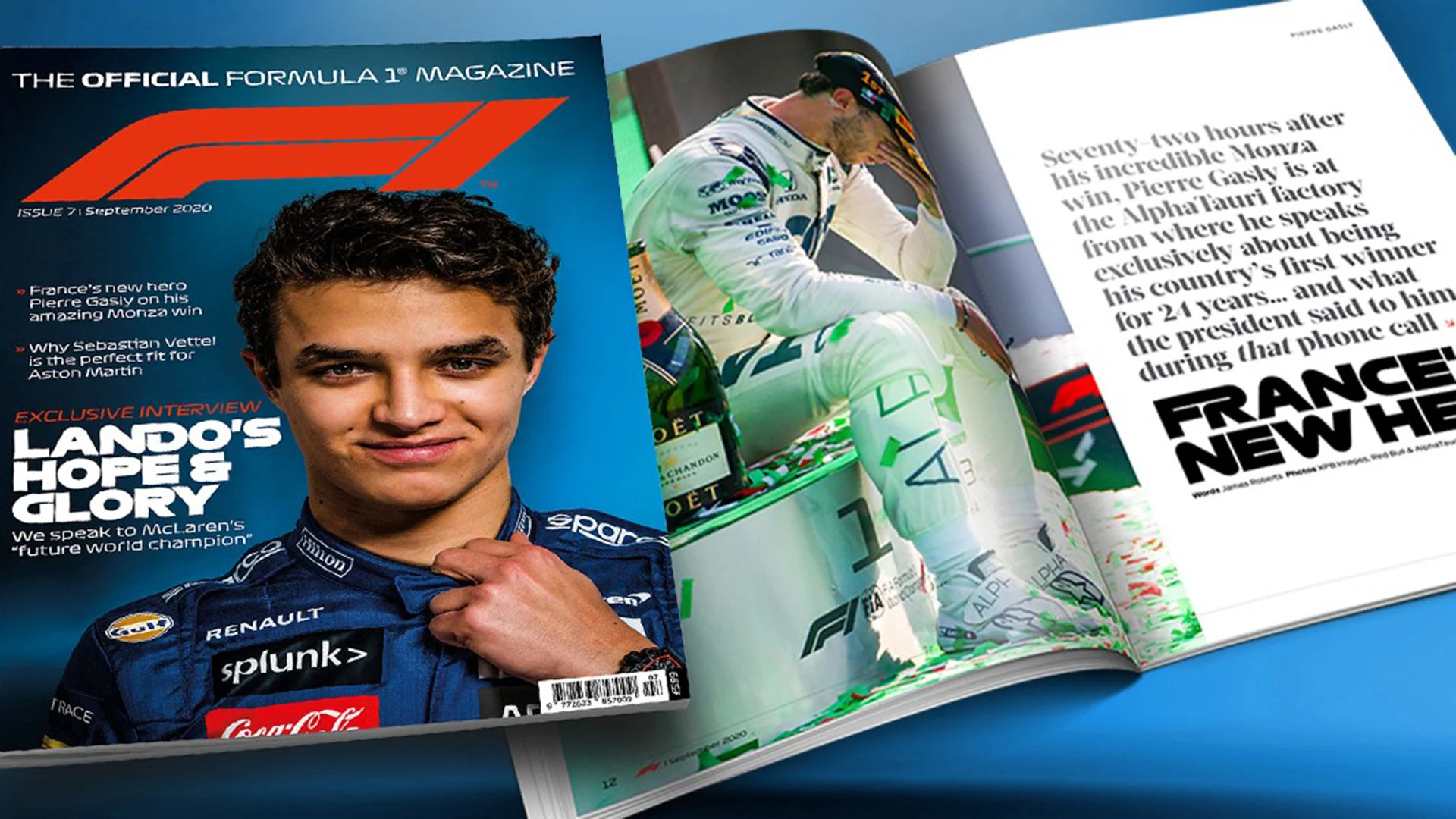
Next Up
Related Articles
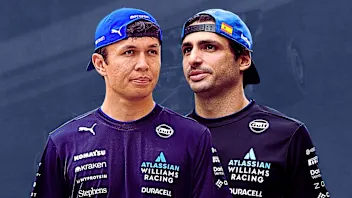 Team Previews 2026All you need to know about Williams
Team Previews 2026All you need to know about Williams.webp) DRIVING TOMORROW: Button on the future of the F1 driver pathway
DRIVING TOMORROW: Button on the future of the F1 driver pathway.webp) Doohan joins Haas as reserve driver for 2026
Doohan joins Haas as reserve driver for 2026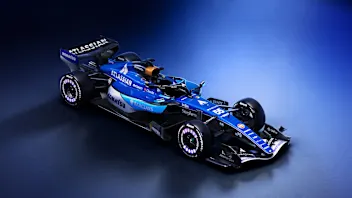 Williams show off their new livery for 2026 F1 season
Williams show off their new livery for 2026 F1 season.webp) Newey opens up on debut Aston Martin design
Newey opens up on debut Aston Martin design.webp) Why January could be the busiest month for F1 drivers
Why January could be the busiest month for F1 drivers